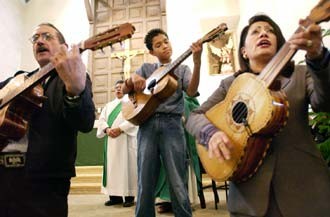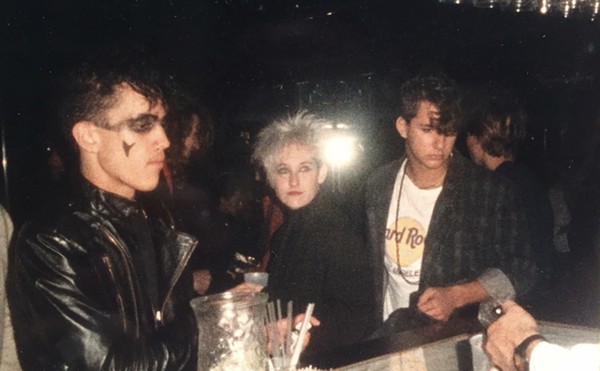| A recent performance of Mariachi Mass at Mission San José (courtesy photo) |
Geraldine Orta-Charles approached Mariachi Mass with the zeal of a crusading missionary. Every Sunday morning, Orta-Charles, a gifted singer/guitarist, and the daughter of local Mariachi Mass founders Jesse and Josephine Orta, performed Mass at St. Joseph's Church, raced over to St. Patrick's Church to do the same, and made it to Mission San José in time for their legendary noon Mariachi Mass.
It was all part of Orta-Charles' determination to not only preserve but also spread the tradition her parents established 35 years ago with the first San Antonio Mariachi Mass on Easter Sunday, 1969. So it was fitting that when Orta-Charles - known to her friends as "Boo Boo" - passed away on January 29 at age 44, after a long bout with cancer and kidney failure, her family and friends chose to honor her with a spirited Mariachi Mass that featured some of the area's finest traditional musicians.
Jacquelyn Alonzo, a family friend, recalls that Orta-Charles' voice was so singular and powerful that even churchgoers seated in parts of Mission San José where they couldn't see the performers, always recognized her rich timbre.
"She sang at my great-grandmother's funeral with my mother," Alonzo says. "She didn't need a mic, her voice just boomed. She had a magnificent voice."
Cynthia Munoz, a longtime friend and the founder of Munoz Public Relations, played guitar alongside Orta-Charles at Mission San José when they were children. "Her mom would give free music lessons at the Villa Maria convent," Munoz says. "Kids would learn traditional songs as well as the songs played at mass."
Orta-Charles' parents - Jesse on trumpet and Josephine on the 15-string bandolin - were longtime musicians who had been inspired to establish the Mariachi Mass at Our Lady of Peace Chapel in 1969 after miraculously surviving a potentially life-threatening car accident. At the time, Mariachi Mass was still a new phenomenon in Spanish-speaking countries.
The first Mariachi Mass occurred in 1966 at a small chapel in Cuernavaca, Mexico, and met with such enthusiastic public response that it quickly moved to a large cathedral. The emergence of mariachi music as a presence at Catholic services came in the wake of Pope Paul VI's loosening of rules insisting that Masses be performed in Latin. "Her parents went to Mexico and learned the masses and studied the way they were done," Munoz says.
| Geraldine Orta-Charles (courtesy photo) |
"Her parents started it, but she basically carried it on," Alonzo says. "She spread it throughout San Antonio. She not only played three Masses, but she would teach choir and work with kids."
Orta-Charles and her husband, Osvaldo, were together for the last 23 years, the last 13 as husband and wife. Together, they had two children, a daughter, Danielle, and a son, Matthew. "She was my wife, so she was the best," he says. "But also, what she did was unique. She started playing guitar when she was 9 years old, so she was part of the Mariachi Mass forever."
Orta-Charles also documented the soul-stirring spirit of her church performances on three CDs: Serenatas de La Virgen de Guadalupe, San Antonio te Corona Reina, and a self-titled disc released immediately after her death. Usually working with a small lineup that featured herself on guitarra de golpe, friend James Broadway on the bassy guitarron, and a trio of trumpet players (including her father), Orta-Charles dominated the proceedings with her warm, impassioned vocals. Hearing her interpretations of "Las Mananitas Populares" or the classic ballad "Sabor a Mi," you're struck by her command of both traditional and popular material and the way she could belt out a song with astonishing power, without ever overpowering the song.
Her final CD was recorded between July and October 2002, and remained unreleased prior to her death, according to Munoz, because Orta-Charles grew too weak to complete work on it. Even on this disc, however, her natual ebullience remains undiminished. Receipts from future sales of her CDs will be earmarked for a trust fund for her children.
"She was very outgoing, real lively," Alonzo says. "She made everybody feel like family. She was basically a mother figure to everyone who met her: real loving and open."
Recalling her longtime friend, Munoz goes back to a conversation they had after the gravity of Orta-Charles' condition became obvious.
"She told me she wasn't afraid to die, which was an amazing thing to say," Munoz says. "What she wasn't prepared for was leaving two small children behind." •


















